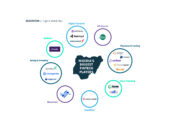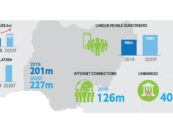Nigeria officially rolled out its central bank digital currency (CBDC), the eNaira, on October 25. This makes it the first country in the African continent to officially allow the use of a CBDC as legal tender.
Originally scheduled for an October 1 launch, the roll out was delayed at the last moment, on September 30.
The delay was reportedly due to a reassessment of potential users, with the eNaira website averaging 2.8 million daily visits pre-launch, Nairametrics reported. Accordingly, the Central Bank of Nigeria (CBN) changed its estimation of potential users to 10x more than the original figure.
Reuters reported that the Nigerian CBDC has now launched with 33 banks, 2,000 customers and 120 merchants had already registered on its platform, available as the eNaira Speed Wallet app on iOS and Android.
The wallets use two-factor authentication with cryptographic encryption.
NAR 200 million has been issued in eNaira so far
So far, eNaira worth NAR 200 million has been issued to financial institutions (the CBDC will maintain parity with the traditional naira).
The launch was attended by just three local television channels, and no questions were allowed, the report said.
Further, President Muhammadu Buhari expects the eNaira to grow Nigeria’s economy by US$29 billion over the next decade, drive direct government welfare payments, and grow the country’s tax base, the report said.
It added that Nigeria-based experts and crypto users were concerned over the use of the eNaira and CBN rules regarding foreign currency.
One expert pointed out a lack of clarity on the transferability of the eNaira, as well as its interoperability with traditional naira and crypto.
Other questions also persist. For instance, to move cash into the wallet, users will need to visit their banks. But as of the end of 2020, 36% of Nigerian adults remained financially excluded. Elsewhere, reports suggest that just 10-20% of Nigeria’s population use smartphones – the remaining are reliant on traditional mobile phones.
The eNaira has been developed in partnership with Bitt Inc, which provided a production-ready digital currency infrastructure to facilitate the deployment of the eNaira. The system is licensed in six Central American and Caribbean countries.
Featured image: edited from Unsplash







2 Comments so far
Jump into a conversation